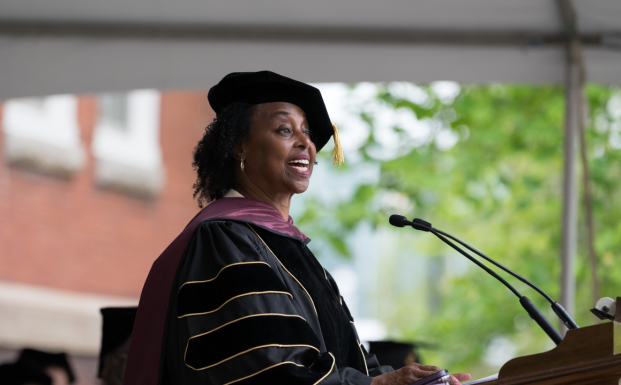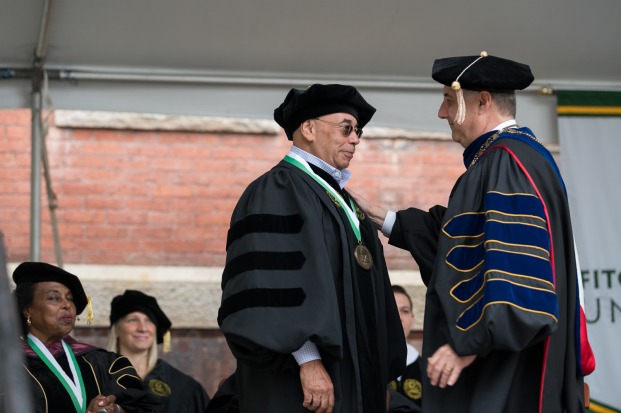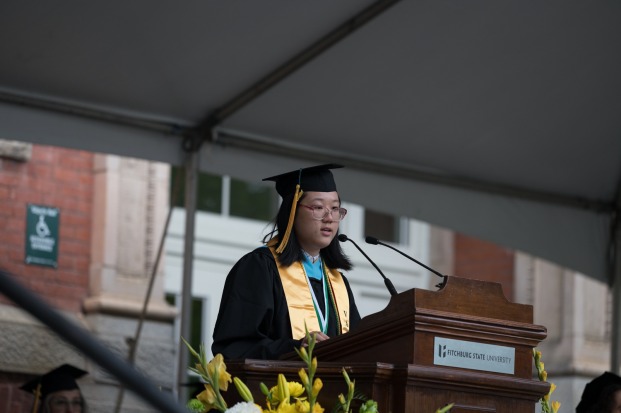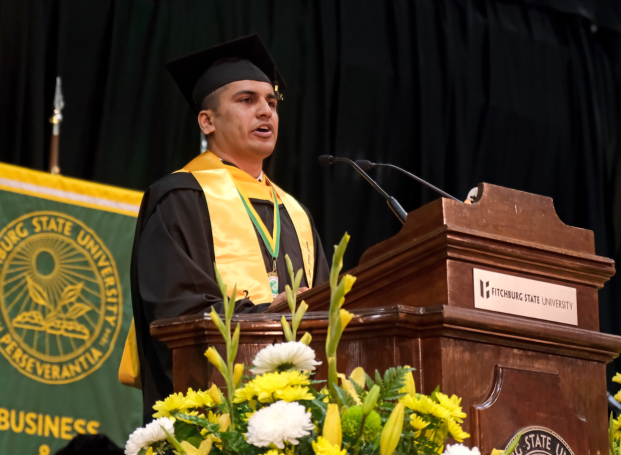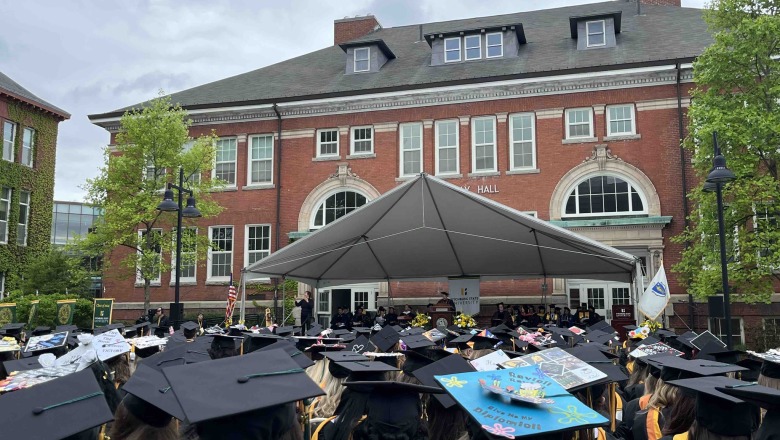
Fitchburg State University held its 128th commencement exercises this month, awarding graduate and undergraduate degrees and honoring distinguished alumni and community leaders. (See photos from the ceremony on the university's SmugMug page.)
The commencement address at the undergraduate ceremony on Saturday, May 18 was given by alumna Yla Eason, an assistant professor of business at Rutgers University and the creator of the country’s first Black superhero toy.
“When my son was three years old, he said he could not be a superhero because he was not white,” Eason recalled in her address. “He said this casually while playing with the Mattel superhero toy, He-Man. My former husband and I were on the beach in Jamaica when he said this. Startled, I said to him, yes you can be a superhero. Your color is great and it means you can be anything you want. We told him we would buy him a Black superhero toy once we got back to New York. To my surprise, there were no superhero toys that looked like him on the market.”
She spoke with other mothers who also wondered why there weren’t toys that looked like their children.
“I asked Dr. Kenneth Clark who with his wife, Mamie, created the Black doll study that led to the 1954 Brown vs The Board of Education decision to end school desegregation if he thought toys that represented different skin tones were important,” Eason said. “He explained to me that when kids play with toys, they imagine themselves in their role-play as powerful and fun. Play is vital to supporting their self-esteem. That’s when I knew that I had to create a Black superhero toy.”
She knew nothing about the toy industry, so, illustrating the advice she offered to graduates, she asked questions.
“I asked and found a toy manufacturer who told me what I needed to do to get started and how toys are made. I asked lots of questions that led me to create Sun-Man, the first Black superhero toy. Later I made Asian, Latino, Native American, and white action figures and expanded into dolls and games. It is why I was able to create a $5 million business and am credited with pioneering the multicultural toy market back in 1985. The irony is that the toy company I was competing against because they had no black action figures, Mattel, reached out to me in 2020 to license my toys. Now almost 40 years later you can find my toy, Sun-Man, at Amazon, Walmart, and other retailers. A selection of my toys is on display at the Strong Museum of Play in Rochester where Sun-Man is in the Toy Hall of Fame.
“The toy business taught me one thing. You don’t have to know everything, you just have to know what you don’t know and then learn it, get someone to do it, and or get someone to teach it to you,” Eason said.
Eason was also presented the President’s Medal in recognition of her lifetime of achievement.
Also honored at the undergraduate ceremony was Reinaldo Lopez, founder of Resource Management Inc., one of the country’s largest Hispanic-owned businesses. Born in Puerto Rico, he migrated to the mainland United States with his mother in 1962 and soon joined her working in the tobacco fields to help support the family. His mother’s tireless work ethic and commitment to family proved a solid foundation upon which Lopez would build for the rest of his career.
He started his company in Massachusetts, eventually growing to oversee more than 6,000 workers nationwide with annual revenues approaching nearly $190 million. His daughter Rachel and son Alex are the company’s current president and vice president, and another son, Reinaldo Jr., established sales records that are still unsurpassed within the firm.
The valedictorian of the undergraduate class was Jyy Rose Liang of Lunenburg, who completed a degree in educational studies with a minor in art.
“The first half of my studies here was attached to a test of resilience for everyone,” she said, recalling the challenges of starting college during the pandemic. “We spoke through microphones and masks, but we discovered much, built community, and became acquainted with new people.”
“As we move forward, the things we do and gain and find to like will not settle in a line,” Liang said. “So, trust yourself, make the most of the process, cross obstacles, and go on. Go after your dreams, and redevelop them as you desire.”
Ali Raza, a native of Pakistan, spoke at the graduate commencement ceremony on Thursday, May 16, where he was presented the Graduate Student Leadership Award. He recounted his journey to the U.S. where studied computer science.
“I had to adjust to a new culture, school system, and unfamiliar surroundings,” Raza said. “I think I’m accepting this award on behalf of every international student who has dared to dream of a better future. We may have come from different corners of the globe, but here, at Fitchburg State University, we have found a home—a place where diversity is celebrated, and dreams are nurtured. In my journey, I’ve learned one simple truth, ‘Never lose hope. Just when you think it’s over. But if you still keep trying. God sends you a miracle.’”
University President Richard S. Lapidus, retiring in June, presided over the final commencement ceremonies of his tenure at Fitchburg State this month.
“Remember in the end, it’s not just about you, but your actions can have profound effects on others around you,” Lapidus said. “There is a saying that can be found around the world in multiple variations that says, ‘The true meaning of life is to plant trees under whose shade you do not expect to sit.’ Be generous, live your life with your heart wide open, extend a helping hand and provide hope and opportunity for others and go plant trees. I think you will find the reward to be far greater than you might imagine.”
